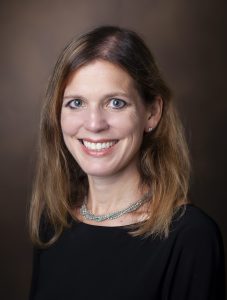COVID changed the world, including the way medical programs recruit potential residents.
Gone are the days when medical students had to travel to learn more about residency options. The diagnostic radiology program at Vanderbilt University Medical Center was among many that pivoted to virtual open houses.
It’s been a successful strategy. Vanderbilt’s joint webinar session with TheRadRoom in August drew approximately 100 attendees, as did each of its program-specific open houses in 2022.
“People had to come up with creative solutions to give applicants a feel for various locations,” said Erin Cooke, MD, who serves as director of the Vanderbilt DR residency program. “The most important thing, of course, is getting to know people.”

Dr. Cooke starts the hour-long open houses with a short introduction about the DR program in conjunction with information from the IR program director Reza Imani, MD, before turning things over to her current residents for peer-to-peer discussions with the remote attendees.
She and other staff drop off the call once their residents take the floor. Staff and residents get together afterward for a debrief.
“It’s run by residents because we want to make sure the applicants have the opportunity to interact with them and really get the feel of what the program is like,” said Dr. Cooke, who’s also an associate professor, clinical radiology and radiological sciences, and director of arts in the Vanderbilt Department of Radiology.
Holding open houses in late summer to early fall gives medical students the chance to better prepare for the application process, which gets busy in September and October. Applicants are getting their materials together now, including requesting letters of recommendation and writing their personal statements.
“On the program side, if we have these virtual open houses right now, applicants can better tailor their application and sometimes their personal statement,” Dr. Cooke said.
The Vanderbilt DR and IR programs hold two remote interactive meet and greet open houses every year and team with the TheRadRoom for another webinar presentation style session. TheRadRoom works with programs across the country, hosting a few at a time during show and tell webinars.
“It’s a little like a third open house,” Dr. Cooke said. “It’s more structured but another opportunity for applicants to learn about the programs and for us to present information.”
One challenge of talking over Zoom instead of in person is ensuring that the candidate is a right fit to interview for one of Vanderbilt’s nine resident openings (six in DR and three in integrated interventional radiology) since most of the information is outgoing on the program side.
Given the setup, the program has little information about whether the student is serious about applying and not just attending an open house because it’s convenient.
“It can be really hard to tell what’s genuine interest versus more like, yeah, why not check it out,” Dr. Cooke said. “However, these sessions are designed to be that way, as the purpose is mainly to allow programs to provide information directly to potential interested applicants.”
One relatively novel way that Dr. Cooke and her peers measure interest is through the Association of American Medical Colleges signals program. Future residents have the option to use these signals in their application to alert directors that they have a strong interest in interviewing at their program. Programs can see which applicants “signaled” them while reviewing applications and before they send interview invitations.
Radiology was added to the program as a specialty last year. Candidates can signal as many as 12 programs.
“When an applicant sends you a signal, that means that they’re very interested,” Dr. Cooke said. “It’s a way for them to show that you’re not just one of 60 places they’re randomly applying to.”
Even with COVID restrictions no longer in place, Dr. Cooke believes remote open houses are here to stay. They have proven to be an efficient way to reach and inform many would-be residents.
“This was a reaction nationally to the pandemic, but we also feel like it has been not just a way for us to showcase ourselves to applicants, but also a way to expand outreach,” she said. “It helps because it was so expensive when people had to travel here. It allows a wider range of people considering our program to check us out who maybe wouldn’t have been able to before.”


